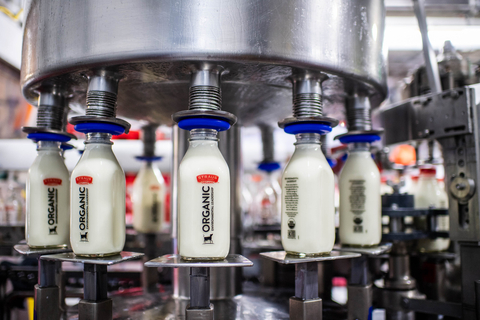
PETALUMA, Calif.– Straus Family Creamery Founder and CEO Albert Straus’ goal of a carbon-neutral dairy farming model on his farm by 2023 is one step closer. California Department of Food and Agriculture (CDFA) authorized commercial use of Blue Ocean Barns’ red seaweed supplement as a feed additive for dairy cows. The decision followed a highly successful trial at Straus Organic Dairy Farm in West Marin, the largest and longest yet conducted with seaweed and dairy cows, proving to dramatically reduce their enteric methane emissions (cow burps) by an average of 52 percent and as much as 90 percent.
There are approximately 1.5 billion cows on the planet, which emit methane in their burps. Cow burps contribute about 2 billion tons of CO2 equivalent per year, more than 4 percent of all greenhouse gas emissions globally.
The Blue Ocean Barns supplement, Brominata, is a dehydrated form of a red seaweed (Asparagopsis taxiformis) that is proven to safely cut cows’ methane emissions from burps by more than 80 percent, without changing the taste of milk, according to peer-reviewed publications. This red seaweed is an easy climate-positive solution for substantially reducing global greenhouse emissions in agriculture at a price that is projected to be cost effective for farmers who manage different acreages and herd sizes.
“The red seaweed is a critical solution towards completing my goal of a carbon-neutral dairy farming model by 2023 and creating an opportunity for our supplying dairy farms to replicate this model by the end of the decade,” said Albert Straus. “This innovation demonstrates that livestock can be part of the primary solution to reduce our climate impact.”
Albert Straus added that organic farming is the foundation for a carbon-neutral dairy farming model and is crucial to helping change our farming and food system around the world. This economically viable dairy farming model is helping sustain family farms while providing organic food to our communities.
Blue Ocean Barns’ Brominata is made from a whole plant and is grown in tanks on land with seawater. The red seaweed supplement is 100 percent natural, and it helps cows derive more nutritional value, especially energy, from their feed. It directly inhibits carbon and hydrogen atoms from forming methane in a cow’s first stomach without disturbing digestion.
“In terms of the entire climate challenge, it’s pretty clear that we’re going to have to do some really difficult, long-range things in the next couple of decades,” said Joan Salwen, Co-Founder and CEO of Blue Ocean Barns. “But feeding a seaweed supplement to cows is something we’re ready to begin right now; it has an immediate impact, and on farm, it’s the easy button.”
Albert Straus’ dairy is the first organic dairy farm committed to using this red seaweed when the certified organic feed becomes available at scale in 2023. For Straus Dairy Farm, regulatory approval is a turning point—a pivotal moment for dairy farmers struggling to keep their farms viable while reducing their climate impact and for the future of dairy farming.
With Blue Ocean Barns solving the problem of growing the red seaweed at scale, the goal is to have the 11 other family-owned, small-scale organic farms that supply Straus Family Creamery use the red seaweed and be carbon neutral by 2030. The supplement will open the door for a replicable carbon-neutral dairy farming model that can be used by any farmer seeking easily implemented solutions to reduce on-farm emissions.
By 2023, Straus Dairy Farm’s organic milk will have a climate-positive footprint, similar to non-dairy, plant-based alternatives and a lower climate impact than soymilk. This is based on a greenhouse gas footprint that includes agriculture and food manufacturing emissions. Reducing the climate impact of organic dairy farming and milk production is imperative to fulfilling Straus Family Creamery’s mission to sustain family farms and revitalize rural communities. This milestone is also changing the future of milk compared with plant-based alternatives.
Agriculture-based climate solutions have been a priority for Straus Dairy Farm since it became the first certified organic dairy west of the Mississippi River, and Straus Family Creamery launched as the first 100 percent certified organic creamery in the United States in 1994.
Foundational sustainable practices started with an unwavering commitment to organic farming, followed soon after by converting cow manure to biogas via a methane digester, then carbon farming for soil health, and on-farm electric equipment. The new seaweed feed, combined with the methane digester, will have a methane emission reduction of 90 percent, enabling Albert Straus’ dairy farm to reach its carbon neutrality goal by 2023.

